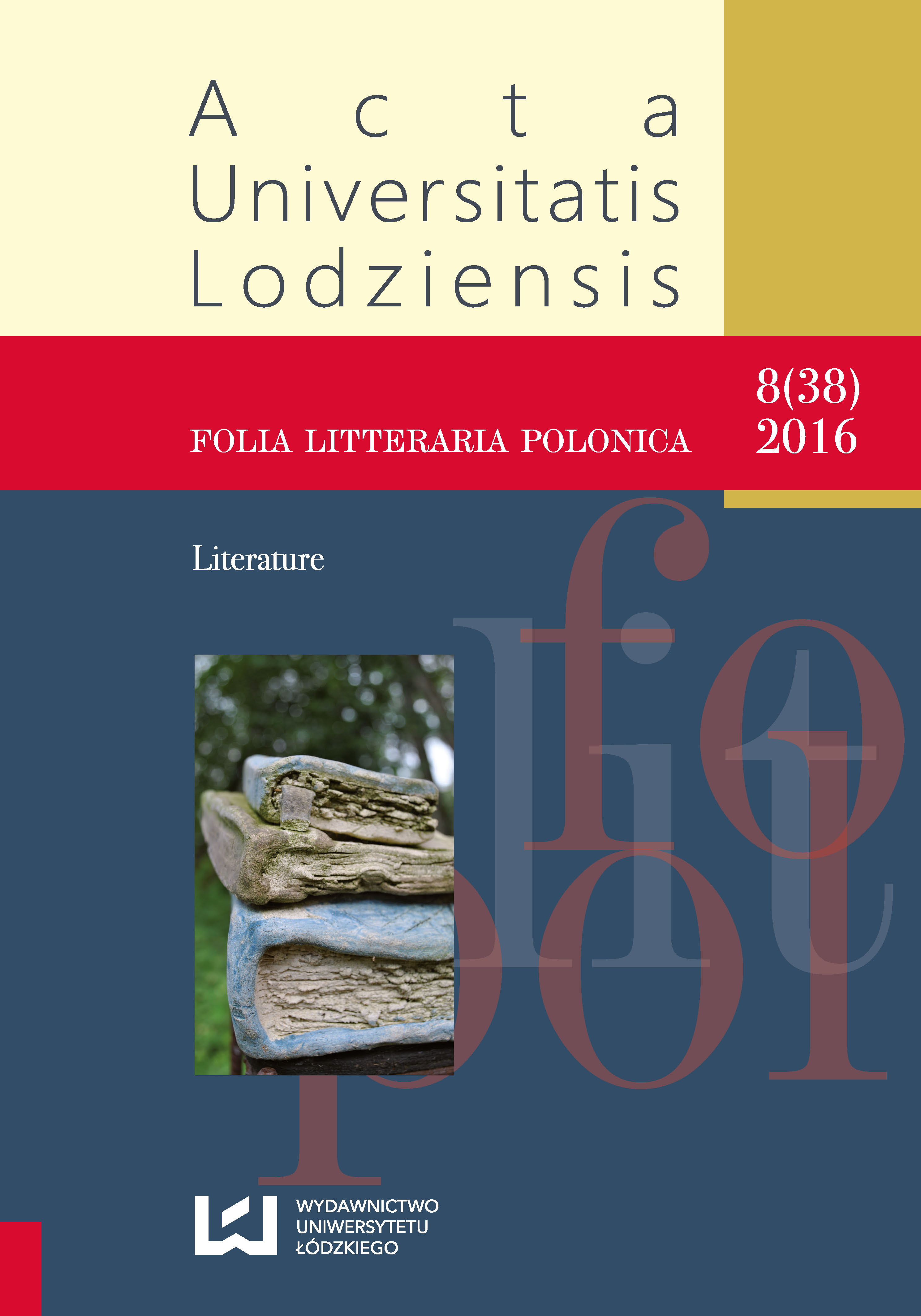Poetic Lithuania of Miłosz
DOI:
https://doi.org/10.18778/1505-9057.38.08Słowa kluczowe:
Czesław Miłosz, poetry, poetic images of LithuaniaAbstrakt
The article deals with the images of Lithuania found in Czesław Miłosz’s poetry. The novels and essays have only been used to confirm the conclusions drawn from the interpretation of selected poems. Despite the frequently-declared unwillingness of the author of Dolina Issy (The Valley of the Issa) to accept and use any autobiographical elements in literature, the land of his childhood has always been present in all the poet’s works. The explanation of this fascination with nostalgia seems to be unsatisfactory. The author of the article perceives the poetic images of Lithuania created by the uprooted immigrant as a symbol of his inner, not purely geographical, settlement. The subject of the discussion is the ever-changing perception of the Eastern-Borderland, which corresponds to particular stages of the protagonist’s journey through life. The starting point is the experience of eviction. It modifies the originally idealized vision of the “little homeland” and makes the hero’s attempt to reject or “amputate” it. The poems from the Światło dzienne (Daylight) collection surprise the reader by a hostile attitude towards the poet’s youth spent in Lithuania and the perception of those early memories as some destructive forces threatening the artist. It is only after a many years’ quest that the borderland heritage is appreciated and conquered again. Now, however, it acquires a different, more symbolic form. The cycle Miasto bez imienia (A Town without a Name) and the poem Gdzie wschodzi słońce i kędy zapada (Where the Sun Rises and Sets) are evidence of a gradual transformation. The faithful recreation in the poet’s memory of particular places and people changes into the construction of some outside religious space, built from the traces of the real world. Lithuania changes into a perfect reality, a Super-Land, capable of retaining the past and combining it with the present. It is a prop freeing the poet from the waste land of Urizen.
Pobrania
Bibliografia
Czesława Miłosza autoportret przekorny, interviewed by A. Fiut, Wydawnictwo Literackie, Cracow 1988.
Google Scholar
Gorczyńska Renata (Czarnecka Ewa), Podróżny świata. Rozmowy z Czesławem Miłoszem.Komentarze, Wydawnictwo Literackie, Cracow 1992.
Google Scholar
Dudek Jolanta, “Gdzie wschodzi słońce i kędy zapada”. Europejskie korzenie poezji Czesława Miłosza, Nakł. Uniwersytetu Jagiellońskiego, Cracow 1991.
Google Scholar
Fiut Aleksander, Moment wieczny. O poezji Czesława Miłosza, Open, Cracow 1993.
Google Scholar
Gombrowicz Witold, Dzienniki 1953–1956, Wydawnictwo Literackie, Cracow 1989.
Google Scholar
Heidegger Martin, Budować, mieszkać, myśleć. Eseje wybrane, Krzysztof Michalski (ed.), Czytelnik, Warsaw 1977.
Google Scholar
Karpiński Wojciech, Spotkanie w San Francisco, in: idem, W Central Parku, Libella, Paryż 1982.
Google Scholar
Kowalczykowa Alina, Wileńskie fascynacje, czyli o barokowej młodości Juliusza Słowackiego, “Ruch Literacki” 1988, issue 6 (171), pp. 402–414.
Google Scholar
Król Marcin, Podróż romantyczna, Libella, Paryż 1986.
Google Scholar
Miłosz Czesław, Widzenia nad zatoką San Francisco, Wydawnictwo Literackie, Cracow 1989.
Google Scholar
Miłosz Czesław, Dolina Issy, Wydawnictwo Literackie, Cracow 1989.
Google Scholar
Miłosz Czesław, Ogród nauk, Wydawnictwo KUL, Lublin 1986.
Google Scholar
Miłosz Czesław, Zaczynając od moich ulic, Instytut Literacki, Wroclaw 1990.
Google Scholar
Miłosz Czesław, Hymn o perle, Wydawnictwo Literackie, Cracow 1983.
Google Scholar
Miłosz Czesław, Prywatne obowiązki, Pojezierze, Olsztyn 1990.
Google Scholar
Miłosz Czesław, Kontynenty, Znak, Cracow 2001.
Google Scholar
Miłosz Czesław, Rodzinna Europa, Wydawnictwo Literackie, Cracow 2001.
Google Scholar
Miłosz Czesław Ziemia Ulro, PIW, Warsaw 1982.
Google Scholar
Miłosz Czesław Świadectwo poezji, Czytelnik, Warsaw 1987.
Google Scholar
Miłosz Czesław, Szukanie ojczyzny, Znak, Cracow 1992.
Google Scholar
Miłosz Czesław, La Combe [przedmowa do: S. Vincenz, Po stronie pamięci], Instytut Literacki, Paryż 1965.
Google Scholar
Wachowicz Barbara, Ty jesteś jak zdrowie, Rytm, Warsaw 1993.
Google Scholar











